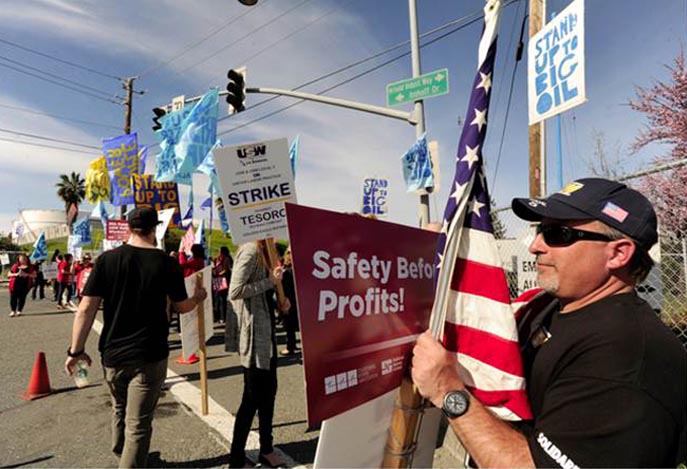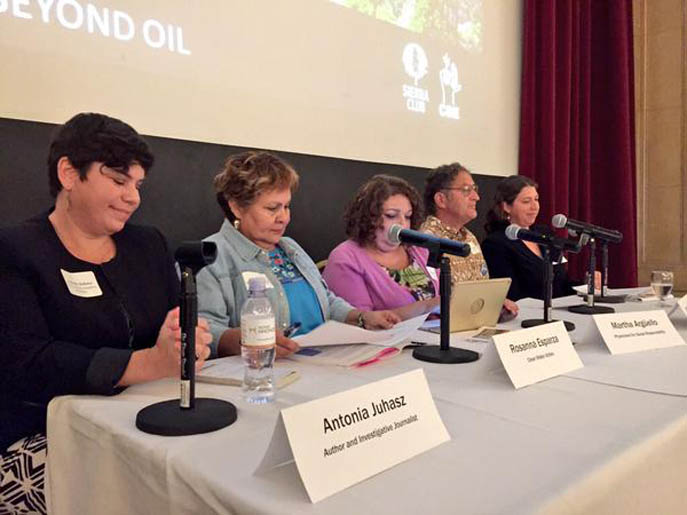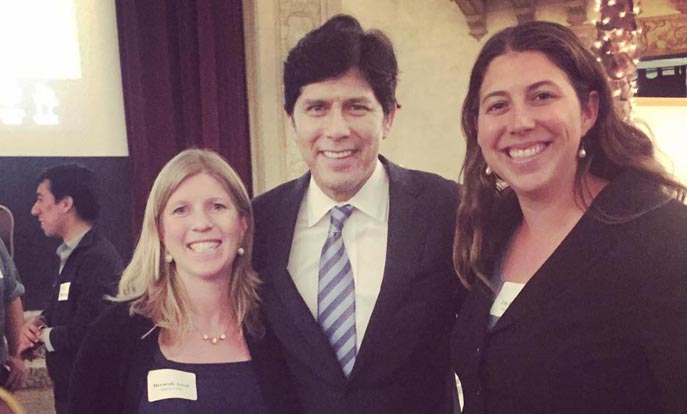
Employees striking over safety hazards at the Tesoro oil refinery in Martinez, California, earlier this year.
The Sierra Club’s 2015 Moving California Beyond Oil Summit could not have come at a more pivotal time. In the last two weeks, Pope Francis made an urgent call to Congress to act aggressively on its moral obligation to address climate change, Hilary Clinton rolled out her energy and climate policy prioritizing the expansion of a clean energy economy, and Shell Oil announced its withdrawal from Arctic oil drilling pursuits and its multi-billion dollar investment losses in exploring that region. California also passed SB350, requiring the state to achieve a 50 percent increase in building energy efficiency and obtain 50 percent of the state’s power from renewable energy sources by 2030, thus securing California’s role as a leading player in the fight against climate change.
The Summit -- co-hosted by the Sierra Club, Communities for a Better Environment, San Jose City Council Member Ash Kalra, Berkeley Vice Mayor Linda Maio, and West Hollywood Mayor Lindsay Horvath -- convened mayors, other elected and agency officials, as well as clean vehicle and transit industry stakeholders from across the state to address the role of local jurisdictions in combating the petroleum industry’s attempts to thwart our democracy, and to adopt measures to rapidly and equitably transition California to a clean fuel economy.
The day began with two panels addressing the threats to California of extreme crude oil, including fracking and urban oil drilling, as well as the transport of volatile crude by rail in unsafe tank cars known to derail, spill, and explode, threatening our schools, local businesses, and water resources. With Bakken and tar sands crude processed at polluting refineries in our urban areas and largely destined for export to the world market, California communities bear the burden of toxic air emissions, water pollution, and the threat of catastrophic accidents, while Big Oil reaps the profits.

Panelists at the Moving California Beyond Oil Summit.
Panelists such as San Luis Obispo Mayor Jan Marx discussed how cities and towns at the interface of the dirty oil supply chain can halt the expansion of dangerous oil supply infrastructure. The health risks to people living near wells are significant, and local jurisdictions, like San Benito County, are adopting fracking bans within their borders and leveraging other tools to mitigate the public health and safety impacts of oil production. While California’s demand for oil has decreased, our communities should no longer shoulder the burden of millions of dollars in health care costs and thousands of deaths every year associated with the production and processing of dirty, extreme fuels.
California’s Senate President Pro Tempore Kevin de Leon gave the lunchtime keynote address. Senator de Leon aptly refuted the fallacy of Big Oil’s message that climate change legislation that reduces our petroleum use and improves energy efficiency will lead to gas rationing and damage our economy. To the contrary, California -- which already has the world’s most progressive climate change policies, including AB32, the Low Carbon Fuel Standard and now SB350 -- maintains the 8th largest economy in the world and has created nearly half-a-million jobs as a result of the state’s commitment to bold policies that cut greenhouse gas emissions and reduce demand for carbon-intensive fossil fuels.
Senator de Leon was unequivocal in his message that clean fuel vehicles and transit options must become real and tangible options for all communities and individuals at every income level in order to achieve a 100 percent clean fuel economy. State policies are making this happen with tax credits and bundling options that provide incentives to individuals to get rid of their dirty clunkers and purchase low- or zero-emission vehicles for low monthly payments and little-to-no fuel costs. One of the single most important actions city officials and local jurisdictions can take to accelerate this transition is to work closely with their municipal and investor-owned utilities to ensure that long-term planning involves investments in clean fuel infrastructure and technology innovation to make clean vehicles, transit, and energy efficiency options accessible to all Californians.

California Senate President Pro Tempore de Leon, flanked by Sierra Club attorneys Devorah Ancel and Elly Benson.
The afternoon panels focused on California’s clean transportation transition, with experts from the transit and low-emission and electric vehicle sectors discussing how clean transportation options are becoming more accessible and how this expansion is creating thousands of jobs for Californians. A representative from Southern California Edison shared how the utility is integrating electric vehicles and other transportation electrification initiatives into its planning, as well as efforts to make these options available to low-income customers. The San Joaquin Regional Transit District has leveraged tens of millions of dollars in public and private resources to build out clean transit infrastructure, such as zero emission electric and hybrid buses, in partnership with companies like Proterra, Inc. that are leading the transit sector in building out clean transit infrastructure. Tapping into these public and private partnerships is a critical action that must be taken by cities across the state.
Finally, Dr. Alberto Ayala, Deputy Executive Officer of the California Air Resources Board, who is in charge of implementing and monitoring the state’s clean fuel policies such as the zero-emissions vehicles and low-carbon fuel standards, drove home the message that California is leading the transition to avoid climate catastrophe while growing its economy. Since 2000, the state’s GDP and population have steadily increased while making significant cuts in greenhouse gas emissions (on an overall, per capita, and per GDP basis) and reducing oil consumption. California can only maintain this progress with the support of cities and local jurisdictions. Local officials must seek participation in California Climate Investments and work with agencies to leverage investments and support clean transportation infrastructure rollout, promote low-carbon transportation, and raise public awareness about zero-emissions vehicles -- and how to access programs that make them affordable to everyone. Much of this effort begins with local officials developing progressive, sustainable community strategies (pursuant to SB375) that integrate transportation and emissions targets with responsible land-use planning.
The 2015 Moving California Beyond Oil Summit was inspirational, and it exemplified the real power of local government to stop Big Oil from polluting our communities and diluting our democracy, while leveraging resources and implementing local policies that will transition California into a 100 percent clean fuel economy without leaving any community behind.
The Sierra Club is proud to partner with local and state leaders who are championing these efforts. Together with our co-host Communities for a Better Environment, we look forward to continuing to develop a powerful network of local and state officials, environmental justice organizations, and green industry partners who are allied in building a sustainable and equitable California.
Links to additional resources and future collaboration opportunities will be emailed to our participants. Thank you to all who participated!